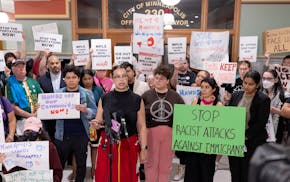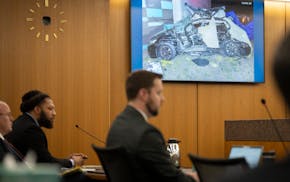For more than a decade, Lynne Crockett has relied upon her mobile police scanner to stay informed about crime in her neighborhood.
The real-time communications between dispatchers and law enforcement helped determine which city blocks were too dangerous to host community events and when it was time to usher small children indoors.
"It made me feel safer," said Crockett, a lifelong North Sider and a retired community liaison worker at Minneapolis Public Schools. "Anything I can do to stay ahead of the curve."
Soon, the reassuring crackle of that radio will fall silent.
Minneapolis was set to start testing encrypted emergency dispatch channels Monday, with an anticipated blackout on all transmissions as of May 1.
That means concerned residents like Crockett, as well as members of the media, will no longer be able to listen in on or independently monitor police actions in Minnesota's most populous city.
The changeover comes amid a nationwide debate about how to best protect the integrity of ongoing investigations and prevent the release of confidential data, like the names and addresses of victims and witnesses, while balancing the public's right to information.
City officials point to new state Bureau of Criminal Apprehension (BCA) and federal guidelines limiting what details can be aired over an open channel. Ensuring compliance, they say, requires a crackdown on authorized users. No subscription to popular online scanner platforms, such as Broadcastify or Zello, can bypass that encryption technology once it's deployed.
"The dramatic rise in the use of social media and scanner apps to track first responders jeopardizes emergency response operations and can lead to the spread of incomplete, inaccurate or unsubstantiated information," a city spokesman wrote in a news release. "This can cause safety concerns for first responders and the public."
It's not clear what, if any, recent examples exist of disruptions to local law enforcement operations as a result of uninterrupted 911 radio traffic.
A number of smaller jurisdictions have already curtailed public access to those transmissions, including Edina, St. Louis Park, Rochester, Minneapolis-St. Paul Airport Police, and the counties of Dakota, Scott, Carver and Olmsted.
But in Minneapolis, where city leaders have faced mounting pressure for better police accountability since George Floyd's murder, the move raises serious concerns for First Amendment attorneys and government watchdog groups.
"This is one more way to shut off public access to what I would call kind of operational, raw data that can actually be quite revelatory as to whether a police department is doing its job properly," said Jane Kirtley, a professor of media ethics and law at the University of Minnesota. "We should have the right to monitor what they're doing for ourselves."
A blow to transparency
Minneapolis police have long used encrypted channels for sensitive investigations, or specialized units like SWAT, but not for everyday 911 calls and radio traffic. When an officer wished to convey sensitive information, they would often move to a restricted frequency or call a supervisor on their cellphone.
Withholding all dispatch communiques reverses the decadeslong practice of allowing the public to listen and react to law enforcement activity in real time, a valuable resource for journalists and civilian scanner jockeys seeking to keep a close eye on what's happening in their communities.
The proliferation of mobile scanner apps made it easier to track police movements than ever before — attracting large, often devout audiences, particularly during critical events like mass shootings.
Several major U.S. cities ― from San Francisco to Denver to New York ― switched to encrypted channels in recent years, citing officer safety and privacy concerns.
Top law enforcement officials, including Minneapolis Police Chief Brian O'Hara, have said they worry about compromising victims' personal information or the risk of tipping off a suspect by continuing to air uncensored tactical data over dispatch.
MPD spokesman Sgt. Garrett Parten pointed to one case in July 2023, when a listener following the manhunt for a murder suspect beat officers to the scene and began livestreaming before the man could be taken into custody.
But critics argue that limiting the flow of information actually erodes trust in police by making it substantially harder to verify their official version of events through other sources — and ultimately hold them accountable.
Last August, a coalition of Twin Cities news outlets, including the Minnesota Star Tribune, wrote a letter to elected officials outlining why unfettered access to scanner audio helps better inform the public about breaking news, sometimes even preventing potential unrest or false rumors from spreading on social media.
Radio traffic provides critical insight into the circumstances of the initial emergency response, as well as what police say and observe while at the scene. It can help reveal whether a suspect is armed, fired a weapon at officers first or otherwise attacked them; and whether police attempted other means to gain compliance during an arrest before resorting to lethal force.
Local media tried to find a compromise solution that would retain some measure of access — like in Chicago, where the police department made transmissions public after a 30-minute delay.
"It fell on deaf ears," said Leita Walker, an attorney at Ballard Spahr LLP, who attempted to facilitate an encryption key for the mainstream press. "As a result, the media will be hamstrung in bringing important information about public safety to people in a timely manner."
That is particularly troublesome in Minneapolis, Walker added, where the police department "has a history of not telling the whole truth when it comes to incidents that make them look bad."
In a joint interview Monday, Minneapolis Emergency Call Center Director Joni Hodne and Community Safety Commissioner Todd Barnette said their staff lacks the capacity to redact private data – even with a delay – on the estimated 450,000 emergency calls assigned to police each year.
"That's a lot of air traffic," Hodne said. "I do not have the ability to do that with the technology that I currently have."
The overall cost to replace hundreds of outdated squad and handheld police radios, then program the new encryption software this year, was not immediately known.
Dashboard replacing scanner
In 2019, the Hennepin County Sheriff's Office became the first known agency in the state to adopt encryption. The decision affected 25 suburban agencies that receive 911 dispatch service through the county.
Maj. Shane Magnuson said his deputies are better able to de-escalate or slow down volatile situations, like barricaded suspects, when their team's movements aren't aired publicly in real time. It has also prevented the further release of unverified data, like potential suspect names and descriptions of individuals later determined to be innocent.
"There's a significant chance" that information from initial 911 calls is either incorrect or incomplete, Magnuson told the Star Tribune last summer. "Dispatchers are trying to get the best information they can with callers who are having maybe the worst day of their life and are under a ton of stress and do not have the complete picture themselves."
In lieu of dispatch audio, Minneapolis is launching a new 911 Emergency Incidents Dashboard aimed at keeping the public informed while mitigating privacy concerns.
The webpage, which automatically updates every 30 minutes, will list all 911 calls over the past 12 hours. Incidents are mapped by location and categorized by date, responding agency (police, fire or behavioral crisis response unit), squad number, neighborhood or problem code.
Emergency calls more than 12 hours old will feed into a separate, archival dashboard that remains searchable to the public.
Rather than going completely dark like other neighboring cities, Barnette said it was critical for Minneapolis to maintain public access to data.
"That dashboard will provide people with more information than they have now," he said. "Normally, you would not see every single call that's coming into 911. Now you will."
But gone are the days when citizen sleuths could tune in to their scanners and vet the raw audio themselves. That's a disappointment to Crockett, the north Minneapolis resident, who long found comfort in tracking response times.
"It's nice to hear the police doing the right thing, too. We can hear everything," she said, noting that losing that ability may unintentionally result in community members having less faith in the institution as a whole.
"It feels more like they're trying to hide something than they are trying to protect somebody."

How the federal raid unified the fractious Minneapolis City Council against Trump, sort of
Trump travel ban 'cruel,' Minnesota advocacy group says

Minneapolis City Council lowers street food cart license fee, hoping fruit sellers will hawk legally

No verdict after first day of jury deliberation in Derrick Thompson murder trial for crash that killed 5

